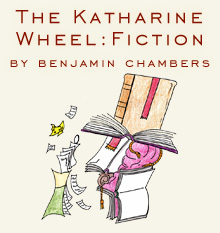Emdashes—Modern Times Between the Lines
The Basics:
About Emdashes | Email us
Ask the Librarians
Best of Emdashes: Hit Parade
A Web Comic: The Wavy Rule
Features & Columns:
Headline Shooter
On the Spot
Looked Into
Sempé Fi: Cover Art
Leaping Lepidopterists! Nabokov on Lo, Plain Lo, and Lit
Filed under: The Katharine Wheel: On Fiction Tagged: Benjamin Chambers, Boris Pasternak, Marcel Proust, Thomas Mann, Vladimir Nabokov

Here’s the master, reading the amazing opening of Lolita in French and Russian; talking a little about a book he’s writing “about the texture of time” that will eventually become Ada; playing speed chess with his dithering wife, Vera; and walking into dinner in Montreux with Vera and his son, Dimitri.
Oh, yeah: even though the clip is under 7 minutes long, Nabokov also manages to dis Mann, Pasternak, and Proust; and read, snorting, from a list of things he hates (example: “humility”). It’s narrated in French, but Nabokov speaks in English, so if French isn’t your thing, you won’t miss much. (Thanks to Martin and kottke.org for the link.)
I’d never seen Nabokov on video or heard his voice before, but he was almost exactly what I would’ve expected. I was going to make a crack here about how he would’ve been a terrible talk show guest, but then I ran across a clip of him on a talk show with Lionel Trilling, and had to eat my unspoken words:
(Go here for part 2.)
The show itself is strikingly dated (Nabokov answers the interviewer’s first question by reading from prepared notecards, and more than once during part 2, the interviewer blocks the camera’s view of Trilling simply by leaning forward to get something from the coffee table). Still, it’s worth watching if you’re interested in what Nabokov wanted people to think he thought about Lolita, and because he gets off a great zinger: “I don’t wish to touch hearts, and I don’t even want to affect minds, very much,” he says, and then adds, “I leave the field of ideas to Dr. Schweitzer and Dr. Zhivago….”
It’s fascinating to watch Nabokov claim, with apparent sincerity, that “the good reader” will know that he and Humbert Humbert are not one and the same because Humbert Humbert confuses hummingbirds with another creature. “Now, I would never do that,” Nabokov says, “being an entomologist.”
It’s hard to know if he seriously expects us to find that convincing (after all, he’s presuming that all of his “good readers” will know that he’s an entomologist), or if he’s being deeply ironical. Before seeing him on tape, I would’ve said the latter, given his capacity for games within games, but now I wonder.
In any case, that’s not the end of the Nabokoviana I’ve got in store for you today. First, there’s this delightful photo of Nabokov and his wife hunting butterflies, courtesy of Life magazine and Martin; next, there’s Christopher Plummer’s eerie recreation of Nabokov lecturing a class at Cornell on Kafka, taken from a 30-minute film made in 1989; and then a fascinating piece about Nabokov’s gay younger brother, Sergei, who died in a concentration camp in 1945.
Lastly, we come to Nabokov’s review of his own memoir, Speak, Memory. The review appeared posthumously, in the December 28, 1998 issue of The New Yorker. I’m not certain why it wasn’t published during his lifetime, but I’d like to think that Nabokov knew the piece didn’t work.
Though the fictitious reviewer is supposedly reviewing “Speak Memory” along with another book (which is as fictitious as the reviewer), he devotes all his time to Nabokov’s memoir and never says anything about the other book, beyond a few lines of glancing praise. In part, Nabokov was making a point about how little there was to say about cliched, sentimental books, but of course, his own book turns out to be the only thing worth talking about, and so the whole piece, rather than being a delightful riff on authenticity, ends up feeling like an early case of astroturfing.
Nevertheless, it’s enlightening; yet another view of the trickster behind the scenes.




Comments
Oh, just brilliant stuff. After four novels, I haven’t been able to work up the enthusiasm for VN that many do; still, he’s a fascinating character. Maybe I should read Pnin, as Gary Shteyngart said he does monthly, on a panel at the New Yorker Festival in October. I probably like his perverse Lectures on Literature more than his novels.
Ha! on “astroturfing,” very suggestive. It’s part that and part “sockpuppetry,” and yet not really either of those, lacking the essential intent to deceive. Maybe it’s like a director’s commentary on a DVD? Or Wes Anderson’s AmEx commercial?
In short, we find that coercion, in money as in other matters, brings, not order, but conflict and chaos. ,